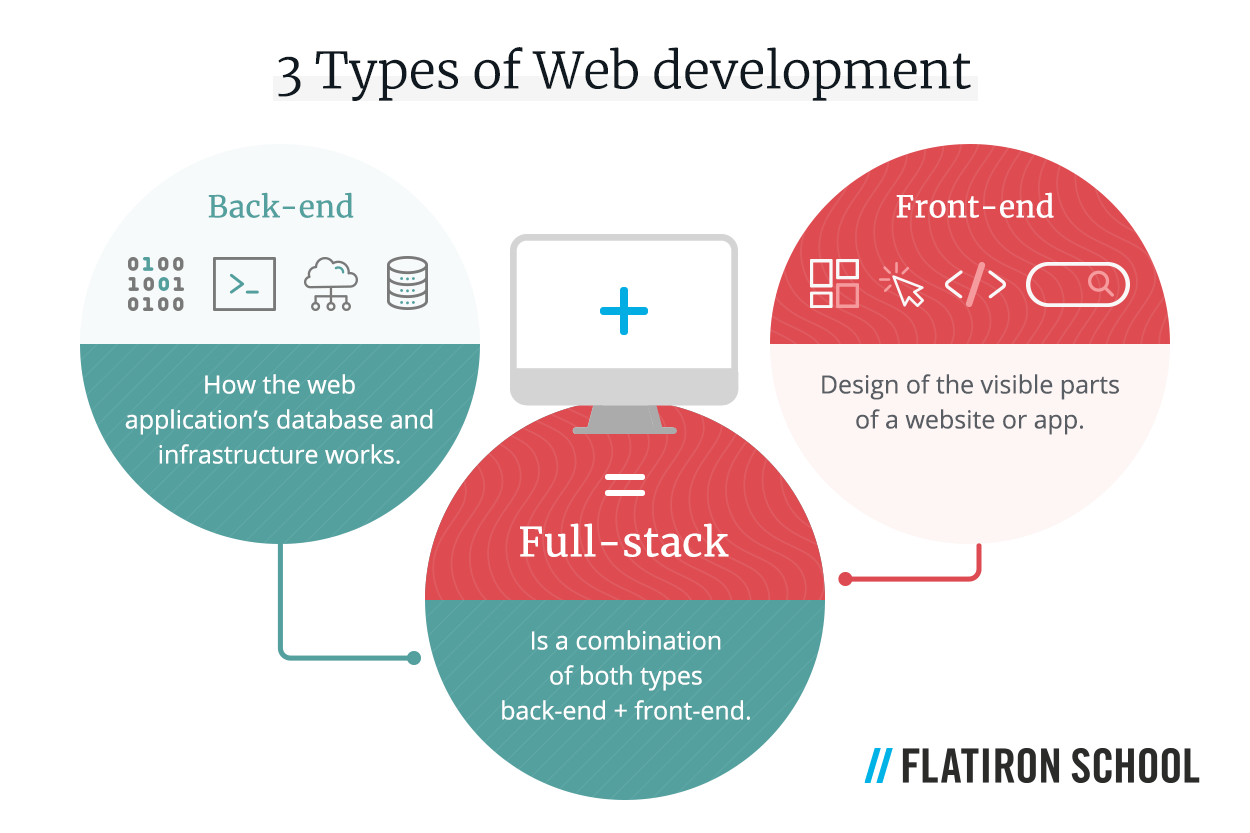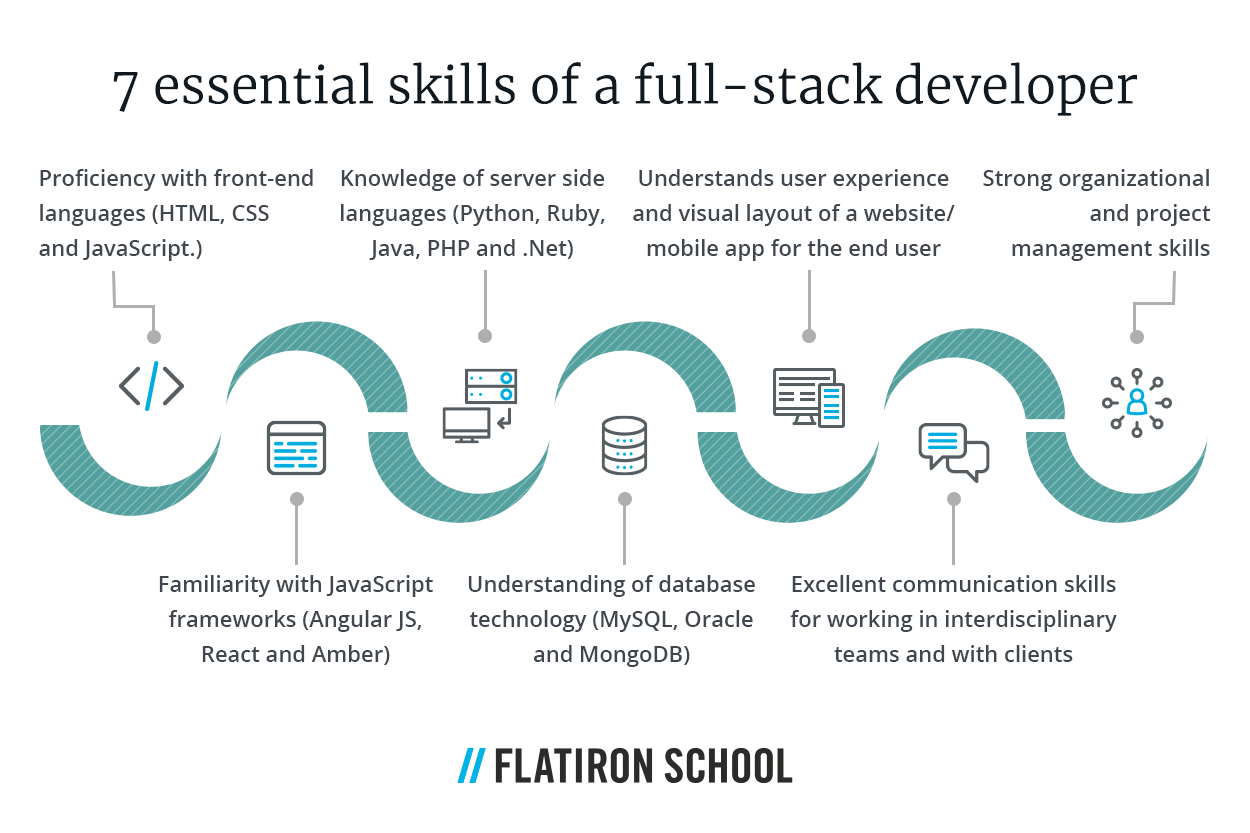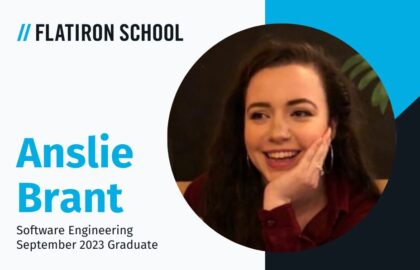What is a Full Stack Developer?

As the web becomes more complex, companies are looking for developers who can do it all. Full stack development may be your next big career step.
Key takeaways:
- Full stack development refers to both the front-end and back-end elements of a web application.
- Front-end development involves how information is displayed on websites and mobile apps.
- Back-end web development refers to the server-side development of a web application.
- A full stack web developer has the coding and programming skills to develop and manage elements on both the front-end and back-end of an application.
- Full stack web developers will typically know HTML, CSS, JavaScript, Python, Ruby, and PHP.

Full stack development refers to both the front-end and back-end of a web application. From a job opportunity standpoint, becoming a full stack web developer means you can choose to focus on one area of expertise or open your horizon to a host of full stack roles. Plus, this means you can really make a big impact at your company since you will be able to dig into various stages of a project and help see a web development project through from start to finish.
To understand full stack development, it’s helpful to first look at the roles of front-end and back-end web development.
There are three types of web development:
- Front-end includes the visible parts of a website or app
- Back-end involves a web application’s databases and infrastructure
- Full stack is a combination of both types. It can also apply to a native application stack (i.e. software programs for specific devices) in addition to web and mobile applications.
Front-end development involves how information is displayed on websites and mobile apps. Since users interact directly with websites and apps, front-end development considers both visual presentation and the core concepts of UX design.
On the other hand, back-end web development refers to the server-side development of a web application. It primarily focuses on building and maintaining the technology that allows a user-facing website to live online.

What is a full stack developer?
Full stack developers are web developers who work with both the front-end and back-end of a website or application, including programming languages. To put it another way, they can build user-facing websites, manage servers and databases, and even work strategically with clients. Because of these skills, they are valuable and sought-after by hiring managers and recruiters.
Typically, full stack developers:
- Know front-end languages and scripts such as HTML, CSS, and JavaScript.
- Are familiar with one or more back-end programming languages, like Ruby, Python, or PHP
Although full stack developers are very knowledgeable, they may specialize in just a few areas, depending on their job description. For example, they may spend most of their time on front-end development. However, they understand the full picture and can step in as needed. This dual ability is what makes them valuable.
What should a full stack developer know?

To be successful, full stack developers should know both the client side (front-end) and server side (back-end) of web development.
Front-end developers must understand various coding languages. These include HTML, CSS, and the scripting language JavaScript. With these languages, developers can shape the visual elements on a website. This ensures they are aesthetically appealing for the user.
The main goal of a front-end developer is to provide an interactive experience for the user. That being said, some front-end developers are also well versed in web design. Layout, colors, and graphics, for example, are all things that a front-end developer must take into consideration. (If this interests you, read about how to become a web developer).
In contrast, back-end developers are concerned with a website’s functionality. They are often tasked with troubleshooting using languages like Python, Ruby, and PHP. Also, they must be able to write code in order to receive information from the user.
This information is then stored on a database. Databases help in efficient retrieval, insertion and deletion of data before organizing them into tables, views, schemas, and reports. To manage these databases, back-end developers may learn MySQL or SQL for relational and non-relational management systems, respectively.
Back-end developers also have to deal with server management. Servers are applications that host a database and serve information to a website. Cloud-based programs provide infrastructure and are an alternative to database management.
Want to learn more about how to become a full stack developer? Book a 10-minute chat with admissions today.
What skills are required?
Considered a jack of all trades, full stack developers boast a multitude of skills. These skills are both technical and non-technical in nature. Please note that they do not need to know all of the following programming languages and frameworks at an expert level. Familiarity with many and proficiency in a few is more commonly expected, and you can always continue learning.
Here are the essential skills of a full stack developer:
- Proficiency with fundamental front-end languages such as HTML, CSS and JavaScript.
- Familiarity with JavaScript frameworks such as Angular JS, React and Amber.
- Knowledge of server side languages such as Python, Ruby, Java, PHP and .Net.
- Understanding of database technology such as MySQL, Oracle and MongoDB.
- Must understand the user experience and how to visually layout a website or mobile app for the end user
- Excellent communication skills for working in interdisciplinary teams and with clients
- Strong organizational and project management skills

What jobs can I get as a full stack developer?
A full stack developer is generally responsible for both front-end and back-end languages and frameworks. Even if you are trained as a full stack developer, you are eligible for jobs that are specific to front-end or back-end development, which opens you up to a host of job opportunities.
Of course, as with anything, your potential job titles and salaries will vary with your years of experience and your location. But these are some job titles you can expect to get as an entry-level developer:
- A junior full stack developer, often the first job many new grads get, has an average national salary of $63,918.*
- Senior full stack developers have an average salary of $111,516.*
- A lead full stack developer makes $138,373* a year on average.
*salaries listed are current as of June 2021.
How do I become a full stack developer with no experience?
If you’re ready to become a full stack developer, there’s no time like the present. These developers are in high-demand.
Traditionally, it could take years to gain the experience you need to apply for full stack development roles. However, you can seek a job as a junior developer. There are a number of coding bootcamps offered as alternatives to help you become job-ready in less than a year, no matter your background or prior career.
Here’s what you need to become a full stack developer without experience:
- Learn the necessary front-end and back-end programming languages
- Understand the “big picture” – how all aspects of web development work together
- Implement your knowledge through hands-on projects
- Good mentoring and/or career coaching
At Flatiron School, we offer courses (and free lessons) to help hone front-end, back-end, and full stack web development skills so that you can land a job quickly. If you’re ready to upgrade your career, learn more about coding bootcamp.
Think full stack development is the career for you? Apply now to start your career journey.
Disclaimer: The information in this blog is current as of September 23, 2021. Current policies, offerings, procedures, and programs may differ.



